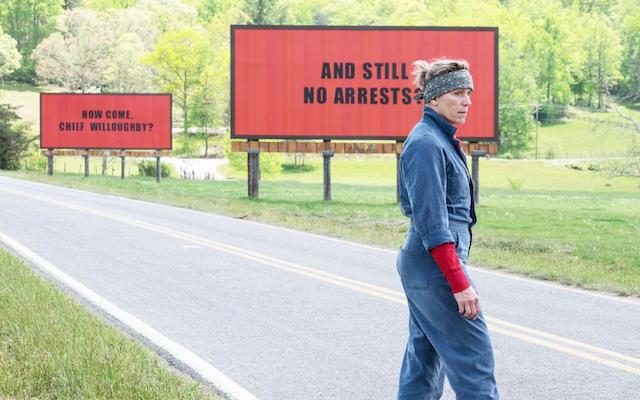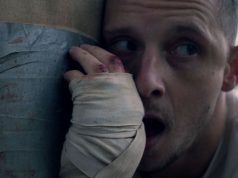
Martin McDonagh, who was born and raised in London but has Irish parents and dual citizenship, examined the squalid, petty lives of his countrymen in several caustically funny stage plays before turning to movies: “In Bruges” dealt with hitmen and remorse; “Seven Psychopaths” took the action to Hollywood and commented on hyper-violent American filmmaking. His third picture, “Three Billboards Outside Ebbing, Missouri” takes it a step further, scrutinizing the way Americans respond to real-life violence. McDonagh’s gaze is piercing, his opinion of us dim … but if it’s any consolation, that’s how his plays treat his Irish characters, too.
“Three Billboards…” is grim, often hilarious, and consistently thought-provoking, with heart-rending pain at its center. Mildred Hayes (Frances McDormand) rents the titular ad space outside the titular (but fictional) podunk Midwestern town to put up a message calling out the local sheriff for not having arrested anyone yet for the months-ago rape and murder of her daughter. The crime shocked the town (everyone knows who “Angela Hayes” was), but Chief Willoughby (Woody Harrelson) is well liked, and his deputies, while not exemplary lawmen — more on that later — don’t seem to have botched the investigation in any obvious way.
Willoughby, patient and folksy, clearly a longtime acquaintance of Mildred’s, understands her frustration but tells her there simply wasn’t anything more they could do. There were no witnesses. They have the killer’s DNA, but it doesn’t match anyone in the system. What are they supposed to do, take the DNA of every man in town? How do they know he was even a local?
Mildred’s response is righteous, indignant, and extreme: “If it was me, I’d start up a database, every male baby what’s born, stick ’em on it, cross-reference it, and as soon as they done something wrong, make a hundred percent certain it was a correct match, then kill em.”
One is tempted, in late 2017, to think that sounds like a fine idea. Mildred was abused by her ex-cop ex-husband, Charlie (John Hawkes); between that, her daughter’s murder, and the good-ol’-boys jocularity of the local cops, she’s about HAD IT with men. But to go around compelling DNA samples from every adult male in the region would be illegal and possibly unethical. We sympathize with Mildred, but we see Willoughby’s point of view. Furthermore, he’s dying of cancer, and Mildred’s billboards call him out by name. Is this fair? Can Mildred be right and wrong at the same time?
Responding less diplomatically to the billboards is Willoughby’s right-hand man, Officer Jason Dixon (Sam Rockwell), a drunken, hot-headed racist who’s notorious for beating up minority suspects and absolutely should not be in law enforcement. He’s livid with Mildred Hayes and with Red Welby (Caleb Landry Jones), the young man at Ebbing Advertising who rented her the space. Much of the town feels the same way he does, harassing Mildred as well as her teenage son, Robbie (Lucas Hedges), whose own feelings are mixed. His older sister was raped and murdered, and now there are billboards slapping him in the face with that fact every time he drives home.
You see the painful dilemma we’re in here. Don’t worry, it gets worse. As Mildred turns up the heat on the cops (who have no choice but to reopen the case and look again), and as Dixon and the town turn up the heat on Mildred, a number of characters do a number of appalling things in their quest for justice, vengeance, and even redemption. Our heart aches for Mildred — and what a flinty, furious performance by a never-better Frances McDormand — yet we can’t deny she goes too far. Dixon is a vitriolic bully whose first scene has him calling a Mexican a “beaner” and being spat at (deservedly) by a black man, yet his arc winds up testing the limits of our capacity to forgive. (Rockwell also gives one of the best performances of his career, blending his loosey-goosey affability with malevolence and sorrow.) Harrelson’s sheriff is gentle and honorable, notwithstanding his tolerance of Dixon’s misbehavior.
That mixture of goodness and badness in individuals is what makes the film so brutally compelling, as there seems to be no limit to what everyone is capable of. Nearly every character, even the “good guys,” has a moment of cruelty. Sometimes it’s tough but fair, as when Mildred chews out a Catholic priest for having the temerity to scold her, or when she points out to Willoughby how “he said, she said” cases so often end up favoring the he saids. In a few instances, the cruelty even has a loving element to it; the one flashback we see of Mildred and Angela interacting before the girl’s death is starkly memorable in that regard. Other times the cruelty is indefensible yet morbidly funny (a common McDonagh maneuver), making us laugh and then wonder if we ought to be laughing.
McDonagh is not subtle, and “Three Billboards…” sometimes feels too on-the-nose. But at the same time, it has an allegorical feel, like a morality play, intended to be plausible but not exactly realistic. Everyone speaks in a stylized rural patois: “Why don’t ya draw up a little contract betwixt us?”; “Ain’t contravening no laws on propriety”; etc. Everyone is a “type,” but they’re types infused with qualities associated with other types, disparate characters cut from the same rotten cloth. (That cloth: “humanity.”) McDonagh brings up the problems that beset our society — police violence, the oppression of women, institutionalized racism — and wants to know how we’re going to handle them. “Anger begets more anger,” someone says (followed by mockery for using the word “begets”). But these are nasty, entrenched problems. Maybe we need anger. How committed are we to justice? What about vengeance? What about redemption? Can there be too much of any of those things?
The most overt instance of a character directly stating one of the film’s themes is also one of the most important lines, encapsulation McDonagh’s pessimistic view of where we’re headed. One person asks how a particular situation will be dealt with once they arrive at their destination, and the other person says: “I guess we can decide along the way.” No need to establish firm principles of right and wrong now; let’s just see what happens. How’s that working out for us?
A- (1 hr., 55 min.; )





